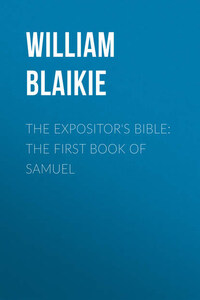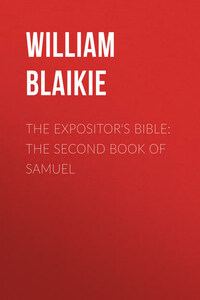CHAPTER I.
HANNAH’S TRIAL AND TRUST
1 Samuel i 1–18
The prophet Samuel, like the book which bears his name, comes in as a connecting link between the Judges and the Kings of Israel. He belonged to a transition period. It was appointed to him to pilot the nation between two stages of its history: from a republic to a monarchy; from a condition of somewhat casual and indefinite arrangements to one of more systematic and orderly government. The great object of his life was to secure that this change should be made in the way most beneficial for the nation, and especially most beneficial for its spiritual interests. Care must be taken that while becoming like the nations in having a king, Israel shall not become like them in religion, but shall continue to stand out in hearty and unswerving allegiance to the law and covenant of their fathers’ God.
Samuel was the last of the judges, and in a sense the first of the prophets. The last of the judges, but not a military judge; not ruling like Samson by physical strength, but by high spiritual qualities and prayer; not so much wrestling against flesh and blood, as against principalities and powers, and the rulers of the darkness of this world, and spiritual wickedness in high places. In this respect his function as judge blended with his work as prophet. Before him, the prophetic office was but a casual illumination; under him it becomes a more steady and systematic light. He was the first of a succession of prophets whom God placed side by side with the kings and priests of Israel to supply that fresh moral and spiritual force which the prevailing worldliness of the one and formalism of the other rendered so necessary for the great ends for which Israel was chosen. With some fine exceptions, the kings and priests would have allowed the seed of Abraham to drift away from the noble purpose for which God had called them; conformity to the world in spirit if not in form was the prevailing tendency; the prophets were raised up to hold the nation firmly to the covenant, to vindicate the claims of its heavenly King, to thunder judgments against idolatry and all rebellion, and pour words of comfort into the hearts of all who were faithful to their God, and who looked for redemption in Israel. Of this order of God’s servants Samuel was the first. And called as he was to this office at a transition period, the importance of it was all the greater. It was a work for which no ordinary man was needed, and for which no ordinary man was found.
Very often the finger of God is seen very clearly in connection with the birth and early training of those who are to become His greatest agents. The instances of Moses, Samson, and John the Baptist, to say nothing of our blessed Lord, are familiar to us all. Very often the family from which the great man is raised up is among the obscurest and least distinguished of the country. The “certain man” who lived in some quiet cottage at Ramathaim-Zophim would never probably have emerged from his native obscurity but for God’s purpose to make a chosen vessel of his son. In the case of this family, and in the circumstances of Samuel’s birth, we see a remarkable overruling of human infirmity to the purposes of the Divine will. If Peninnah had been kind to Hannah, Samuel might never have been born. It was the unbearable harshness of Peninnah that drove Hannah to the throne of grace, and brought to her wrestling faith the blessing she so eagerly pled for. What must have seemed to Hannah at the time a most painful dispensation became the occasion of a glorious rejoicing. The very element that aggravated her trial was that which led to her triumph. Like many another, Hannah found the beginning of her life intensely painful, and as a godly woman she no doubt wondered why God seemed to care for her so little. But at evening time there was light; like Job, she saw “the end of the Lord;” the mystery cleared away, and to her as to the patriarch it appeared very clearly that “the Lord is very pitiful and of tender mercy.”
The home in which Samuel is born has some points of quiet interest about it; but these are marred by serious defects. It is a religious household, at least in the sense that the outward duties of religion are carefully attended to; but the moral tone is defective. First, there is that radical blemish – want of unity. No doubt it was tacitly permitted to a man in those days to have two wives. But where there were two wives there were two centres of interest and feeling, and discord must ensue.
Elkanah does not seem to have felt that in having two wives he could do justice to neither. And he had but little sympathy for the particular disappointment of Hannah. He calculated that a woman’s heart-hunger in one direction ought to be satisfied by copious gifts in another. And as to Peninnah, so little idea had she of the connection of true religion and high moral tone, that the occasion of the most solemn religious service of the nation was her time for pouring out her bitterest passion. Hannah is the only one of the three of whom nothing but what is favourable is recorded.











